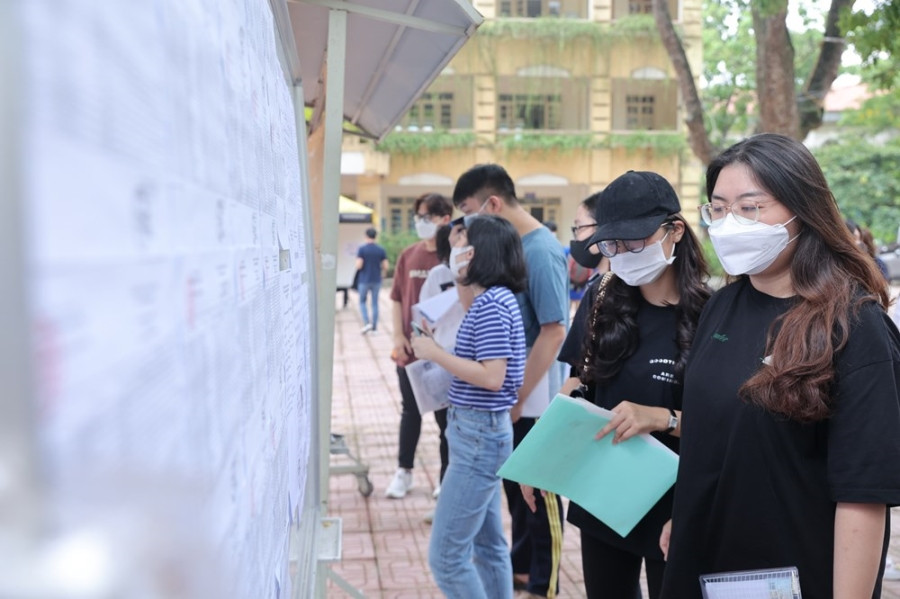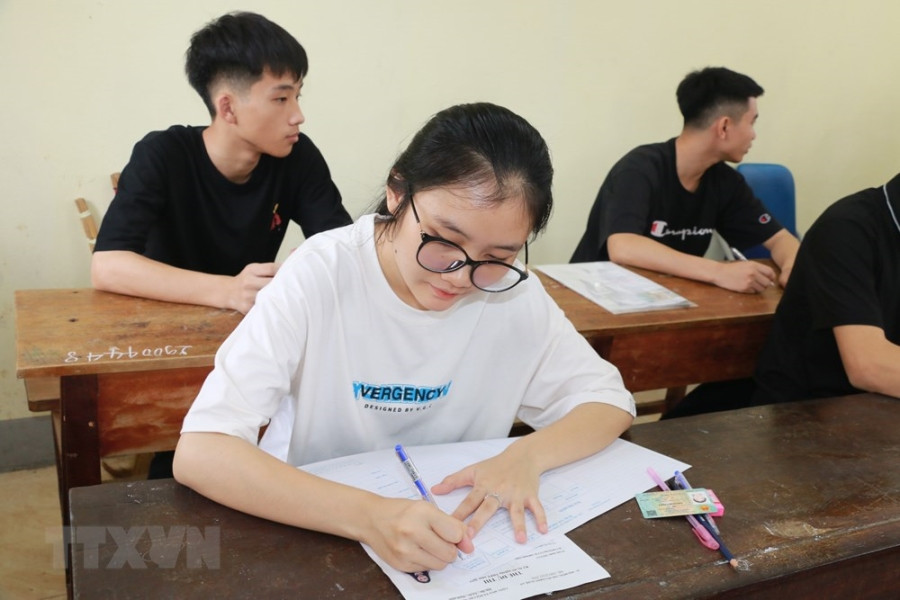Currently, very few universities have announced tuition fees for the next school year while the admission season is approaching, candidates are having a headache choosing a school but lack information.

Illustration
In just over a month, from the beginning of July, candidates will begin registering for university admission. However, besides choosing a major and career, the issue that candidates are concerned about is that many schools have not announced specific tuition fees, while according to Decree 81 of the Government, university tuition fees will increase from the next school year.
Tuition fees are about to increase
Decree 81 of the Prime Minister was issued in August 2021 and took effect from October 2021, regulating tuition fees of the national education system. Accordingly, tuition fees will increase according to a roadmap, starting from the 2022-2023 school year.
However, due to the impact of the COVID-19 pandemic, the Government has requested universities not to increase tuition fees in the 2022-2023 academic year to share the difficulties of the people. University tuition fees in the 2022-2023 academic year therefore remain the same as the 2021-2022 academic year.
Recently, on May 10, at a meeting to listen to a report on tuition fees and textbooks for the 2023-2024 school year at the Government Headquarters, Deputy Prime Minister Tran Hong Ha agreed with the plan for universities and vocational training institutions to implement the roadmap for increasing tuition fees according to Decree 81, in accordance with specific conditions.
Currently, some universities have announced the expected tuition fees for the 2023-2024 school year. Foreign Trade University expects tuition fees to be 25 million VND/student/year for the mass program, 45 million VND/year for the high-quality program, and 70 million VND/year for the advanced program. For students studying the hotel management, digital marketing, digital business, and integrated marketing communications programs, the tuition fee will remain at 60 million VND/year. The increase is about 5 to 10 million VND compared to the tuition fee in 2022.
The Academy of Journalism and Communication also increased tuition fees by about 14% compared to the previous school year, from 440,500 VND/credit to 550,000 VND/credit for the general program, from 1.3 million VND/credit to more than 1.47 million VND/credit for the high-quality program.
The University of Commerce announced new tuition fees in the 2023 enrollment plan from 2.3 to 2.5 million VND/month for standard and career-oriented programs, from more than 3.5 to 4 million VND/month for high-quality and integrated programs.
Similarly, the Academy of Finance, National Economics University, and University of Economics (Vietnam National University, Hanoi) also announced plans to increase tuition fees.
Many schools are still waiting for instructions.
Although all schools have announced their enrollment plans, not many schools have announced their tuition fees. This causes difficulties for candidates and parents as tuition fees are one of the important factors in deciding to choose a school.

Candidates for high school graduation exam in 2022
Although Nguyen Tuan Anh (Kien Xuong district, Thai Binh) wants to study medicine, he is still hesitant because this is the major with the highest tuition fee, while the schools he is interested in, such as Hanoi Medical University and Thai Binh University of Medicine and Pharmacy, have not announced specific tuition fees for the next school year.
“My family's economic conditions are average, so tuition is an issue I have to consider carefully to ensure I can afford it when studying medicine for 6 years,” Tuan Anh shared.
According to Professor Nguyen Huu Tu, Principal of Hanoi Medical University, next school year, the school will increase tuition fees according to the provisions of Decree 81.
This is also shared by leaders of many universities. However, the specific increase is still an open number.
Associate Professor Nguyen Thanh Chuong, Vice Principal of the University of Transport, said that Deputy Prime Minister Tran Hong Ha agreed to the tuition fee increase according to Resolution 81, but at the same time required the increase to be appropriate to specific conditions.
“The school also hopes to soon finalize information on tuition fees so that it can be announced to candidates soon. However, we are still waiting for more specific instructions on this issue,” said Mr. Chuong.
In fact, in the 2022 enrollment season, many universities announced tuition increases and collected tuition fees at new levels, applied according to Decree 81. After the Government requested to keep tuition fees the same as in 2021, schools had to review and return the difference to students.
According to a university leader, tuition fees are a very sensitive issue. Therefore, learning from the experience of 2022 and being before the admissions season, schools will wait for guidance information before deciding on tuition fees and announcing them to candidates, avoiding having to adjust them like last year./.
According to Decree 81, the tuition fee ceiling from the 2022-2023 school year to the 2025-2026 school year for public vocational training institutions that are not self-sufficient in regular expenditures is as follows:
For public vocational training institutions that self-finance regular expenses: The maximum tuition fee is not more than 2 times the above tuition fee. For training programs that have met accreditation standards at public vocational training institutions that self-insure regular expenses, vocational training institutions that partially insure regular expenses, and vocational training institutions whose regular expenses are guaranteed by the State, the maximum tuition fee shall not exceed 2.5 times the above tuition fee. For public vocational education institutions that self-insure their regular and investment expenses: They are allowed to proactively develop and decide on tuition fees according to the provisions of the Law on Vocational Education and other relevant documents. For high-quality training programs (including foreign transfer programs for vocational education), vocational training institutions proactively decide on the tuition fees of that program based on economic and technical norms to ensure sufficient compensation for training costs, with accumulation and disclosure before enrollment. |
According to Vietnam+